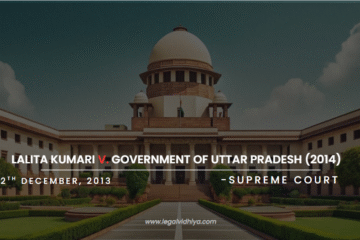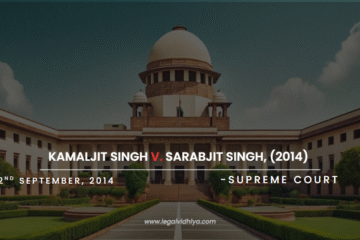
| CITATION | (2013) 10 SCC 324 |
| DATE OF JUDGMENT | 12th August, 2013 |
| COURT | Supreme Court of India |
| APPELLANT | Deepali Gundu Surwase. |
| RESPONDENT | Kranti Junior Adhyapak Mahavidtalaya (D. Ed.) And Others |
| BENCH | G.S. Singhvi and V. Gopala Gowda, JJ. |
INTRODUCTION
This Appeal is filed by the Appellant being aggrieved by the Judgment and Order passed by the single bench of the Hon’ble Bombay High Court, Aurangabad Bench. The question before the Hon’ble Supreme Court is whether the Appellant has the right to receive wages for the period during which she was unlawfully prevented from working by the school’s management.
FACTS OF THE CASE
The appellant was appointed as a teacher at Nandanvan Vidya Mandir (Primary School), which is operated by a trust controlled by the Bagade family and received grant-in-aid from the State Government. However, in 2005, the Municipal Corporation of Aurangabad reclassified the property as commercial, resulting in a tax bill of Rs 79,974/-. In response, the Headmistress, also the Trust’s President, sent a letter to all employees, including the appellant, demanding a monthly contribution of Rs 1500/- to cover the tax. The appellant declined, leading to 25 memos from the management. Ultimately, on 14th November, 2006, the appellant was suspended.
The appellant approached the Education Officer (Primary) at Zila Parishad, Aurangabad, who did not approve the Appellant’s suspension. However, the suspension was not revoked, and the Appellant was not provided the required subsistence allowance mandated by Maharashtra Employees of Private Schools (Conditions of Service) Rules, under Section 16 of the Maharashtra Employees of Private Schools (Conditions of Service) Regulation Act, 1977. The Appellant, therefore invoked the Writ jurisdiction of the Hon’ble High Court. The Hon’ble High Court ordered in favour of the Appellant and ordered her reinstated to duties from 14th March 2007, with consequential benefits as per Rule 37(2)(f) and placed the responsibility of paying arrears on the management.
However, prior to the order of the Hon’ble High Court, the management initiated an inquiry against the appellant under Rules 36 and 37, on 28th December, 2006. The Inquiry Committee conducted an ex parte proceeding and terminated the Appellant’s service. The Appellant challenged this order under Section 9 of the Act, asserting that the management’s actions were arbitrary and violated principles of natural justice. She contended that the inquiry was merely a means to punish her for refusing an unlawful demand by the management.
The Tribunal allowed her appeal, overturning the termination and instructing the management to pay full back wages. The management challenged the Tribunal’s decision in a Writ Petition, and the Single Judge concurred with the Tribunal’s finding that the management’s actions were flawed due to statutory violations and breaches of natural justice. However, the order regarding back wages was set aside.
The Appellant has thus filed the present Appeal
ISSUE RAISED
Whether the Appellant is entitled to back wages for the period when she was kept out of service by the management of the school?
CONTENTIONS OF APPELLANT
The Appellant contended that despite her claim of non-employment, the management failed to present any evidence to the contrary. The counsel asserted that the Tribunal’s decision aligned with the Act and Rules, and the High Court erred in overturning the directive to the management to reimburse the Appellant’s back wages.
The Appellant stressed that due to Rule 33(3)’s restrictions, the Appellant hadn’t pursued other employment and thus shouldn’t have been denied full pay and allowances for the entire period she was kept away from her job.
The Appellant’s counsel relied on precedents such as Hindustan Tin Works (P) Ltd. v. Employees, Surendra Kumar C Verma v. Central Govt, and others to argue that the impugned order should be overturned.
CONTENTIONS OF RESPONDENT
The Respondent in support of the challenged order, argued that the High Court did not err in overturning the Tribunal’s directive for back wages to the Appellant.
The Respondent stressed that, even if the termination is unlawful or tainted by a breach of natural justice, back wages cannot be ordered unless the employee not only pleads but also proves that they were not gainfully employed during the intervening period.
They contended that there was no plea or evidence to show that the Appellant was not employed elsewhere during her suspension and thereafter.
The Respondent cited precedents like M.P. SEB v. Jarina Bell and Kendriya Vidyalaya Sangathan v. S.C. Sharma to assert that the practice of reinstatement with back wages, established in the 1960s and 1970s, has since been moderated.
JUDGEMENT
The Hon’ble Supreme Court observed that the learned Single Judge of the High Court erred significantly by intervening in the Tribunal’s decision to award back wages. The Hon’ble Supreme Court therefore allowed the Appeal, set aside the order passed by the Hon’ble High Court and restored the order passed by the Hon’ble Tribunal. The Hon’ble Supreme Court also directed the management to pay the Appellant full back wages within four months from receiving this order. The Hon’ble Court also warned the management that non-compliance with this order would attract penalties under the Contempt of Courts Act, 1971.
CONCLUSION
The judgment brings closure to the Appellant’s quest for justice by upholding the payment of her wages for the duration in which she was wrongfully prevented from fulfilling her job duties, reaffirming the core principles of justice and equity within the employer-employee relationship.
REFERENCE
- SCC Online
This Article is written by Raj Nagre student of New Law College, Mumbai; Intern at Legal Vidhiya.




0 Comments